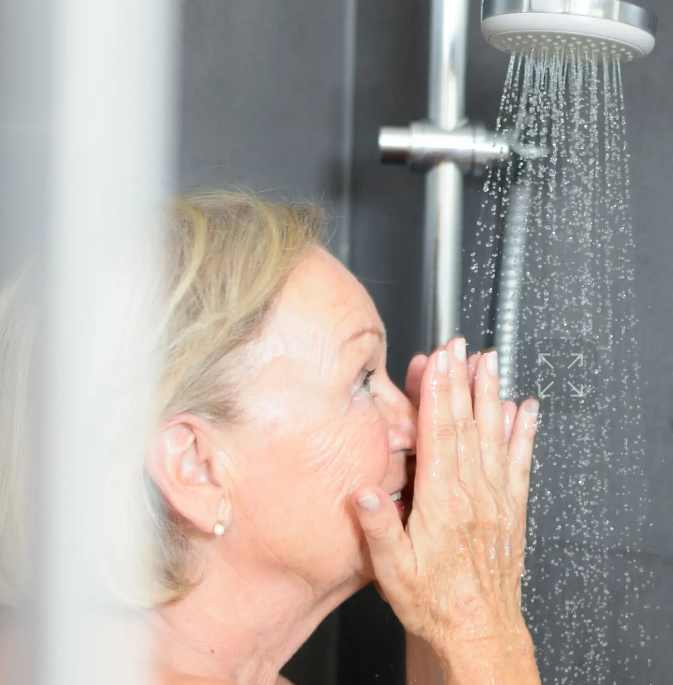Walk-in showers and tubs often play the understated role in the realm of bathroom renovations, overshadowed by more traditional choices. Yet, they carve out a unique position with unmatched accessibility and modern aesthetics. This distinctive appeal sets them apart in the vast domain of bathroom designs, marking walk-in showers and tubs as a category with its own merits.
Key types include doorless showers, low-threshold options, and walk-in bathtubs, each known for their specific advantages. Walk-in showers with seats also stand out, offering added comfort and safety for users. Delving deeper, each type of walk-in shower and tub presents its own array of benefits, installation considerations, design flexibility, and recommendations for use.
The following sections will explore these aspects in detail, providing a deeper appreciation of what makes walk-in showers and tubs a valuable addition to any home.
What is an ideal shower length?

Determining the ideal shower length is crucial for striking a balance between ensuring personal hygiene and being mindful of environmental conservation and utility costs. An optimal shower duration not only aids in maintaining cleanliness but also plays a significant role in conserving water, reducing energy consumption, and keeping utility bills in check. While personal preferences and specific needs undoubtedly influence one’s showering habits, adhering to a general guideline can foster a more sustainable lifestyle.
Accordingly, the recommended shower length is set between 5 to 10 minutes, a timeframe that is considered both efficient for daily cleansing and respectful of our environmental resources. This duration represents a practical compromise, highlighting the importance of efficiency and thoroughness in our daily routines.
Why is shower duration important?
The significance of shower duration reaches far beyond the realm of personal hygiene, impacting water and energy usage, skin well-being, and the environment. Embracing shorter showers plays a crucial role in conserving water and minimizing utility expenses, positioning it as a cornerstone of eco-friendly living. Moreover, moderating the time spent under the shower can aid in protecting skin health, avoiding the dryness and irritation that often accompany prolonged water and heat exposure.
From an environmental standpoint, curtailing shower lengths serves as an accessible yet potent method to reduce one’s carbon footprint, primarily by lessening the demand for water heating systems. Hence, adopting conscientious showering practices not only benefits individuals but also supports wider environmental preservation efforts, underscoring the profound importance of mindful shower duration.
Saves water and reduces bills
Adopting the habit of shorter showers plays a pivotal role in water conservation, dramatically cutting down on the daily water usage. This practice not only aids in safeguarding this precious environmental resource but also manifests in reduced water bills, offering a tangible financial advantage.
Preserves skin health by preventing dryness
Moderating the duration of showers is crucial for skin health. Prolonged exposure to hot water can deplete the skin of essential oils, leading to undesirable dryness and irritation. By keeping showers brief, one can help maintain the skin’s natural moisture levels, fostering healthier skin.
Energy efficiency lowers carbon footprint
Opting for shorter showers significantly boosts energy efficiency by lessening the demand for heated water, a process that is typically energy-intensive. This reduction in energy usage not only translates into lower utility costs but also aids in diminishing carbon emissions, thereby contributing to environmental conservation efforts.
Factors affecting shower length
Several key factors play a role in determining the ideal shower length, encompassing personal hygiene needs, water heater capacity, and environmental consciousness. The necessity for longer showers often arises from one’s level of physical activity or the demands of their occupation, requiring more time for a thorough cleanse. On the other hand, the capacity of the water heater may set a practical limit on how long one can enjoy hot water, particularly in households with multiple individuals.
Moreover, an increased awareness of environmental issues motivates many to shorten their showers, seeing it as a part of a larger effort to live sustainably. Recognizing and balancing these factors is crucial for individuals aiming to adjust their showering practices to better meet their personal and ecological considerations.
Personal hygiene needs vary by activity
Personal hygiene demands fluctuate significantly with one’s level of physical activity. For those involved in strenuous work or regular exercise, longer showers become essential to effectively remove sweat and grime, ensuring optimal cleanliness and comfort.
Water heater capacity limits hot water availability
The capacity of the water heater is a decisive factor in the availability of hot water, directly influencing the maximum length of showers. Especially in homes with multiple occupants, this limitation necessitates careful management of shower duration to accommodate everyone’s needs.
Environmental consciousness encourages shorter showers
A heightened sense of environmental responsibility is prompting individuals to embrace shorter showers, recognizing them as a straightforward strategy for water and energy conservation. This conscious decision to reduce shower length is part of a broader commitment to lessening one’s environmental impact through daily actions.
Recommended shower length

In navigating the intersection of personal hygiene, environmental sustainability, and resource management, the recommended shower length emerges as a consensus at 5 to 10 minutes. This timeframe is deemed adequate for most people to maintain cleanliness while significantly curtailing water and energy usage. Embracing this guideline not only supports water conservation initiatives but also aids in reducing utility expenses and lessening the environmental footprint associated with daily hygiene practices.
It represents a balanced, practical approach that harmonizes individual needs with the collective imperative for sustainability.
5-10 minutes for daily showers
Targeting 5 to 10 minutes for daily showers perfectly balances the essential act of personal hygiene with a commitment to environmental sustainability. This recommended timeframe ensures thorough cleanliness while also minimizing water and energy usage, effectively aligning personal care routines with principles of sustainable living.
Consequences of long showers
Engaging in prolonged showers, while often seen as a method for thorough cleansing, entails several adverse effects. Such practices can result in skin dryness and irritation, as extended exposure to hot water can excessively remove the skin’s natural oils. Beyond personal health, long showers lead to higher utility bills, driven by the increased consumption of water and the energy required for heating it.
On a broader scale, the environmental impact of such habits is profound, with the excessive use of water and energy contributing to a larger carbon footprint. Recognizing these consequences is vital for those aiming to adopt more sustainable and health-conscious lifestyle choices.
Skin dryness and irritation
Prolonged exposure to water during extensive showers can significantly strip away the skin’s essential oils, leading to skin dryness and irritation. Such conditions not only compromise the protective barrier of the skin but also introduce discomfort and heightened sensitivity, underlining the critical need for shorter, more mindful showering habits.
High utility bills for water and heating
Engaging in long showers requires more water and energy to heat that water, culminating in high utility bills. This increased resource consumption imposes a notable financial strain on households, thereby spotlighting the economic advantage of embracing shorter showers.
Environmental impact from excessive water use
The habit of taking extended showers contributes to a considerable environmental impact through the excessive consumption of water and the associated energy demand for heating. This practice leads to the depletion of precious water resources and a rise in energy use, amplifying the ecological footprint of personal hygiene routines and highlighting the urgency of adopting water-conserving measures.
Tips for reducing shower time

Minimizing shower time not only benefits the environment and helps in reducing utility bills, but it is also advantageous for skin health. Practical strategies such as employing a timer to monitor shower duration, turning off the water while soaping or shampooing, and embracing colder showers to naturally decrease the time spent under the water can significantly aid in this endeavor. These approaches promote efficient use of water, encourage energy saving, and facilitate the shift towards more sustainable showering habits.
By integrating these simple yet effective tips into daily routines, individuals can make a meaningful contribution to environmental conservation without sacrificing personal hygiene.
Use a timer to track shower length
Implementing the use of a timer serves as a practical tool to oversee and methodically reduce shower length. By setting a deliberate limit, it cultivates heightened awareness around water use, encouraging proactive steps toward conservation.
Turn off the water while soaping or shampooing
Turning off the water while engaging in soaping or shampooing acts as a straightforward yet impactful measure to cut down water usage. This habit not only conserves a significant amount of water but also instills a disciplined, eco-conscious approach to daily showering routines.
Take colder showers to shorten the duration naturally
Embracing colder showers naturally leads to shorter shower times, as the cooler temperatures tend to deter extended stays under the water. Beyond the immediate benefit of water and energy savings, colder showers are associated with a variety of health advantages, including enhanced circulation and invigorated skin conditions.
Adjusting habits for better shower practices
Embracing improved shower practices necessitates a conscious shift in habits towards water conservation, energy efficiency, and maintaining skin health. Strategies such as gradually reducing shower time by a minute, emphasizing efficient cleaning over prolonged relaxation, and rewarding consistent behavior towards shorter showers can significantly aid in this transformation. These adjustments not only pave the way for a more sustainable lifestyle but also promote a healthier approach to personal care.
By adopting these practices, individuals can make meaningful contributions to reducing their environmental footprint while enhancing their daily well-being.
Gradually reduce shower time by 1 minute
Embarking on the journey to gradually reduce shower time by just one minute offers a manageable yet effective strategy for conservation. This gentle adjustment fosters an easy adaptation, enabling a seamless shift towards more sustainable showering habits without compromising personal comfort.
Focus on efficient cleaning rather than relaxation
Centering the shower experience on efficient cleaning rather than leisurely relaxation can significantly expedite the process. By concentrating on the core objective of showering, one can effectively minimize water and energy use, thereby aligning with environmentally responsible practices.
Reward yourself for consistently shorter showers
Creating a personal incentive system for consistently maintaining shorter showers can be a compelling incentive. Whether it’s indulging in a small luxury, allocating time for a favorite activity, or another form of personal reward, celebrating these successes can greatly enhance motivation, making the adoption of eco-friendly habits a more gratifying and sustainable endeavor.
Request A Free Design Consultation
Considering an upgrade to your bathroom with a new walk-in shower or tub? Our free design consultation is your gateway to personalized, expert advice tailored specifically to your needs and style preferences. This no-obligation service connects you with experienced professionals ready to explore your vision, offer a variety of design solutions, and provide recommendations to achieve a bathroom that is not only functional and stylish but also enhances accessibility.
Whether your goal is to improve safety features, increase comfort, or update the aesthetics of your space, our consultation aims to transform your ideas into tangible results, ensuring your renovation project aligns seamlessly with your lifestyle and budget constraints.
Key Takeaways
Adopting efficient shower practices transcends mere water conservation; it represents a comprehensive approach that positively impacts your skin health, finances, and the environment. By adhering to the advised 5 to 10-minute shower duration, implementing strategies to diminish water use, and consciously modifying your shower habits, you can markedly decrease your daily consumption of water and energy. Each incremental change is a step towards fostering sustainability and personal well-being.
Whether contemplating an upgrade with a walk-in shower or tub or seeking to refine your existing shower routine, these guidelines offer a pathway to more mindful, eco-conscious, and cost-efficient behaviors.
